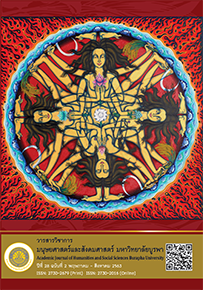The Contemplation-oriented Transformative Learning Facilitation for Cultivating Eco-cultural Entrepreneurs of the Bang Pakong Communities
Main Article Content
Abstract
With the basic assumption to give a priority to human beings and their learning process, this research aimed to investigate the contemplation-oriented transformative learning facilitation appropriate for the cultivation of eco-cultural entrepreneurs of the Bang Pakong communities as well as to study their capabilities found after the completion of the program. The methodology used was action research; and data were collected and analyzed qualitatively; using focus group interview, journaling, non-participant observation, and in-depth interview as research tools. The results revealed that the appropriate learning process was found to be a participatory and experiential one, with a good balance between inner and outer practices; whilst values, meanings, and intents were prioritized over other things. Meanwhile, crucial capabilities developed in participants were deep realization upon root empowerment of the communities, team cohesion, and inspiration and faith in value driven action. As the major outputs, the project yielded 22 spots of cultural space and three different cultural maps.
Downloads
Article Details
บทความทุกบทความเป็นลิขสิทธิ์ของวารสารวิชาการมนุษยศาสตร์และสังคมศาสตร์ มหาวิทยาลัยบูรพาเท่านั้น
References
กฤษฎา บุญชัย. (2560). ว่าด้วยวิจัยท้องถิ่น ตอนที่ 2 Inside Out ญาณวิทยาเชิงลึกของชุมชน. เข้าถึงได้จาก https://www.ldi.or.th/2017/09/08/ว่าด้วยวิจัยท้องถิ่น-ต-2/
กลุ่มงานยุทธศาสตร์และข้อมูลเพื่อการพัฒนาจังหวัด สำนักงานจังหวัดฉะเชิงเทรา. (2559). แผนพัฒนาจังหวัดฉะเชิงเทรา (พ.ศ. 2561-2565) (ฉบับทบทวน). เข้าถึงได้จาก http://www.chachoengsao.go.th/cco/images/plan/plan_ccs65.pdf
ชรินทร์ มั่งคั่ง. (2560). ศักยภาพชุมชนและการมีส่วนร่วมพลเมืองในการจัดการการท่องเที่ยวเชิงนิเวศสู่การเป็นแหล่งเรียนรู้วิสาหกิจชุมชนบ้านแม่กำปอง จังหวัดเชียงใหม่. MFU Connexion, 6(2), 265-294.
ชูศักดิ์ วิทยาภัค. (2561). นิเวศวิทยามนุษย์: การศึกษาสิ่งแวดล้อมในมิติของสังคมและวัฒนธรรม. เชียงใหม่: ศูนย์บริหารงานวิจัย มหาวิทยาลัยเชียงใหม่.
ธนา นิลชัยโกวิทย์ และอดิศร จันทรสุข. (2552). ศิลปะการจัดกระบวนการเรียนรู้เพื่อการเปลี่ยนแปลง: คู่มือกระบวนกรจิตตปัญญา. นครปฐม: ศูนย์จิตตปัญญาศึกษา มหาวิทยาลัยมหิดล.
ธีระภัทรา เอกผาชัยสวัสดิ์. (2554). ชุมชนศึกษา (พิมพ์ครั้งที่ 2). กรุงเทพฯ: สำนักพิมพ์แห่งจุฬาลงกรณ์มหาวิทยาลัย.
ตะติยา กาฬสุวรรณ์. (2546). ปัจจัยที่มีผลต่อความเข้มแข็งของชุมชน: ศึกษาเฉพาะกรณีหมู่บ้านรอบศูนย์ศึกษาการพัฒนาเขาหินซ้อนอันเนื่องมาจากพระราชดำริ อำเภอพนมสารคาม จังหวัดฉะเชิงเทรา. วิทยานิพนธ์สังคมสงเคราะห์ศาสตรมหาบัณฑิต, คณะสังคมสงเคราะห์ศาสตร์, มหาวิทยาลัยธรรมศาสตร์.
ผู้เข้าร่วม#1. (2561, 17 กรกฎาคม). สนทนากลุ่ม.
ผู้เข้าร่วม#2. (2561, 19 กรกฎาคม). จดบันทึก.
ผู้เข้าร่วม#3. (2561, 19 กรกฎาคม). จดบันทึก.
ผู้เข้าร่วม#4. (2561, 19 กรกฎาคม). จดบันทึก.
ผู้เข้าร่วม#4. (2561, 4 พฤศจิกายน). จดบันทึก.
ผู้เข้าร่วม#4. (2562, 28 มกราคม). สัมภาษณ์.
ผู้เข้าร่วม#5. (2562, 28 มกราคม). สัมภาษณ์.
ผู้เข้าร่วม#6. (2562, 9 กุมภาพันธ์). สัมภาษณ์.
พลอยโพยม บ้านโพธิ์ (นามสมมติ). (2562, 19 มกราคม). สนทนากลุ่ม.
ภารดี มหาขันธ์. (2555). การตั้งถิ่นฐานและพัฒนาการของภาคตะวันออกยุคปรับปรุงประเทศตามแบบสมัยใหม่ถึงปัจจุบัน. ชลบุรี: มหาวิทยาลัยบูรพา.
วสันต์ ปัญญาแก้ว. (2553). พัฒนาการของศาสตร์ทางสังคม. ใน แนวความคิดพื้นฐานทางสังคมและวัฒนธรรม (หน้า 19-33) (พิมพ์ครั้งที่ 3). เชียงใหม่: ภาควิชาสังคมวิทยาและมานุษยวิทยา คณะสังคมศาสตร์ มหาวิทยาลัยเชียงใหม่.
วิบูลย์ เข็มเฉลิม. (2548). วิถีคนบนป่าตะวันออกผืนสุดท้าย. กรุงเทพฯ: สำนักงานกองทุนสนับสนุนการวิจัย.
สมสิทธิ์ อัสดรนิธี. (2554). ญาณวิทยาของจิตตปัญญาศึกษาในประเทศไทย. วิทยานิพนธ์ศิลปศาสตรมหาบัณฑิต, สาขาวิชาจิตตปัญญาศึกษาและการเรียนรู้สู่การเปลี่ยนแปลง, บัณฑิตวิทยาลัย, มหาวิทยาลัยมหิดล.
สุชาติ ประสิทธิ์รัฐสินธุ์. (2553). ปรัชญาของศาสตร์สังคม. กรุงเทพฯ: สามลดา.
Gehman, J., & Soublière, J. F. (2017). Cultural entrepreneurship: From making culture to culture making. Innovation: Organization & Management, 19(1), 61-73.
Wikipedia. (2018). Cultural ecology. Retrieved from https://en.wikipedia.org/wiki/Cultural_ecology
WinklerPrins, A. M. G. A. (2010). Cultural ecology. Retrieved from http://dx.doi.org/10.4135/9781412939591.n241


